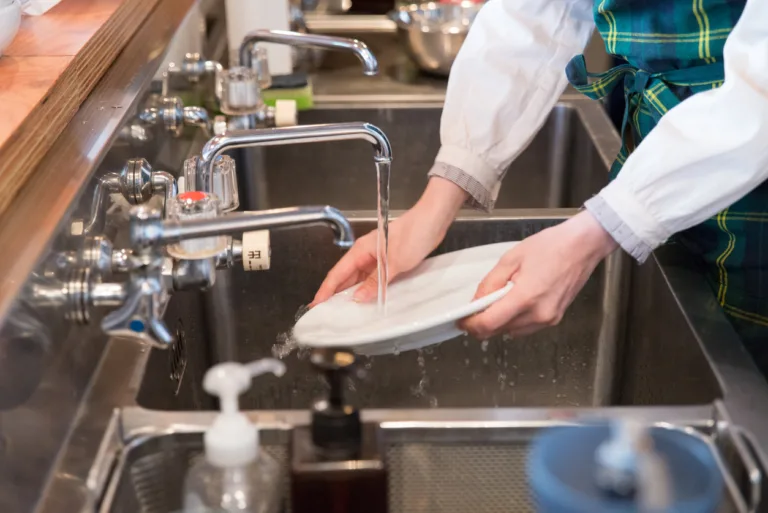Guest Article: The Crucial Role of Sanitation in Restaurants
Ensure Health and Customer Satisfaction Through Sanitation

Deniz Alpaslan is the Senior Director of Marketing at Diversey. Deniz has a BSc in engineering and an MBA from Bilkent University, Turkey. In his role at Diversey, he uses his experience, analytical skills, and customer-first mentality to help to build Diversey programs that put health, safety, and comfort first.
In the restaurant industry, maintaining impeccable sanitation practices isn’t just a legal requirement but a fundamental responsibility. A clean and hygienic environment is paramount to ensuring the health and safety of both customers and staff. From preventing foodborne illnesses to creating a positive dining experience, the role of sanitation in restaurants cannot be overstated.
This article delves into the various aspects of restaurant sanitation, highlighting its significance, best practices, and the benefits it brings to the establishment and its patrons.
Health and Safety:

The primary objective of maintaining high sanitation standards in restaurants is to safeguard the health and safety of everyone involved. The US Centers for Disease Control and Prevention note that poor personal hygiene and contaminated equipment/cross-contamination are among the top 5 foodborne illness risk factors. Thus, proper sanitation practices significantly reduce the risk of foodborne illnesses caused by harmful bacteria, viruses, and other contaminants.
Regular cleaning and sanitizing of surfaces, utensils, equipment, and food preparation areas prevents the cross-contamination of ingredients and ensure that food is safe for consumption. Adequate hand hygiene practices among the staff are equally crucial to minimize the spread of pathogens and maintain a healthy environment.
Regulatory Compliance:
Compliance with sanitation regulations and guidelines is not only essential for health reasons but also a legal requirement in most jurisdictions. Health departments and regulatory bodies enforce strict standards to protect public health. Restaurants must adhere to these regulations, which encompass areas such as proper food handling, temperature control, sanitation protocols, and staff training. Failure to meet these requirements can result in fines, penalties, closure, and damage to the restaurant’s reputation.

Customer Confidence:
Cleanliness and sanitation play a pivotal role in shaping customers’ perception of a restaurant. Patrons expect a clean and hygienic environment when dining out, and any compromises in sanitation can quickly tarnish a restaurant’s reputation.
On the other hand, a restaurant that visibly emphasizes sanitation builds trust and instills confidence in customers. A reputation for maintaining excellent hygiene standards can attract repeat customers, positive reviews, and word-of-mouth referrals, thereby enhancing the restaurant’s success.
Employee Morale and Productivity:
A clean and well-maintained workplace not only benefits customers but also boosts employee morale and productivity. Restaurant staff members are more likely to take pride in their work and maintain high standards when they are provided with a sanitary and organized environment. Proper sanitation practices, including regular cleaning schedules and training programs, demonstrate the restaurant’s commitment to their well-being. Moreover, a healthy work environment minimizes the risk of employee illnesses, reducing absences and ensuring smooth operations.
Pest Control:

Sanitation practices are crucial for effective pest control in restaurants. Pests such as rodents, insects, and flies are attracted to unclean environments and can pose significant risks to food safety.
By maintaining strict sanitation protocols, including proper waste management, regular cleaning, and sealing entry points, restaurants can minimize the likelihood of pest infestations. Timely action and proactive measures not only prevent health hazards but also protect the restaurant’s reputation.
Food Quality and Shelf Life:
The United States Department of Agriculture’s Economic Research Service estimates that 31% of food loss happens at the retail and consumer level. Sanitation directly influences food quality and shelf life by controlling and reducing spoilage microorganisms. Effective cleaning and sanitization procedures prevent the buildup of bacteria, mold, and spoilage organisms on surfaces and equipment. This, in turn, extends the shelf life of ingredients and ensures that the flavors, textures, and nutritional value of the food are preserved and improves restaurants bottom line.
By adhering to proper storage, handling, and cleaning practices, restaurants can maintain the freshness and integrity of their ingredients, delivering exceptional culinary experiences to customers.
Preventing Allergen Cross-Contamination:
In today’s culinary landscape, where food allergies and sensitivities are prevalent, preventing allergen cross-contamination is of utmost importance. Proper sanitation practices are critical in minimizing the risk of cross-contact between allergens and non-allergenic foods. Dedicated equipment, separate food preparation areas, thorough cleaning, and proper staff training are essential to prevent allergic reactions and ensure the safety of diners with specific dietary needs.

Maintaining strict sanitation practices is an essential aspect of running a successful restaurant. From protecting public health and complying with regulations to ensuring customer satisfaction and preventing foodborne illnesses, sanitation plays a multifaceted role in the restaurant industry. By prioritizing cleanliness, adopting best practices, and providing ongoing training to staff, restaurants can create a safe, healthy, and enjoyable dining experience for their customers while building a strong reputation within the industry.
